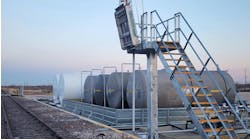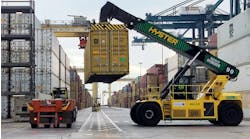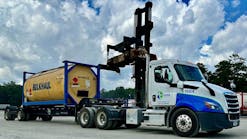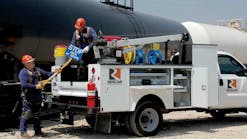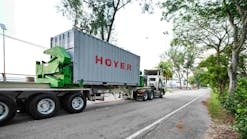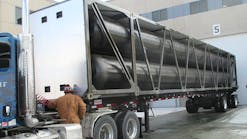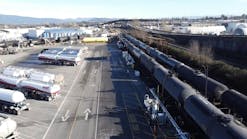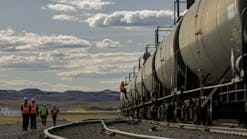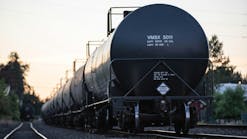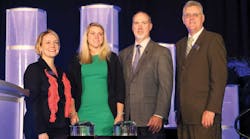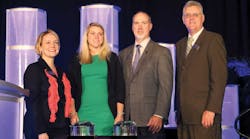Latest from Transloading
ILTA’s 37th International Operating Conference covers multitude of industry issues
A MOST diverse range of topics was covered during the International Liquid Terminals Association’s 37th Annual International Operating Conference. Speakers discussed everything from the moral justification for fossil fuels to nuts-and-bolts best practices for storage terminal operations.
Held June 12-14 in Houston, Texas, ILTA’s flagship event attracted a solid turnout. More than 4,250 terminal industry professionals from around the world participated, including many ILTA terminal and supplier members. The trade show featured 335 exhibiting companies, including 32 first-time exhibitors.
During the trade show, ILTA hosted its Second Annual Trade Show Symposium. Sessions examined US facility security regulations, industry standards for fire protection equipment inspection and maintenance, valve selection criteria, and a case study on terminal facility automation.
ILTA’s 2017 Featured Speaker Alex Epstein, author of “The Moral Case for Fossil Fuels,” kicked off the conference with a discussion on the significance of fossil fuels and how reframing every energy conversation around humans flourishing can make a very persuasive, moral case for fossil fuels. Epstein examined technologies made possible by fossil fuels, explaining that the negative effects of fossil fuels are many times exaggerated.
As chief executive officer of TankBank International Singapore, Tony Quinn has originated over $2.5 billion of terminal sales and acquisitions since 2013. Quinn took the audience on a trip around the world, analyzing the storage terminal infrastructure at key global sites.
“Of the whole of the Amsterdam/Rotterdam/Antwerp region (Belgium and The Netherlands), Rotterdam was the hub,” he said. “We’re seeing a declining refining position in Europe where they are not able to generate quality fuels through current refinery operations. There is a lot of downtime now and the refineries are starting to close or turning to storage positions.
“In Poland, they have beautiful terminals. It’s like a mini-US. It’s fantastic. It’s really high quality, and when they come to sell a facility, they expect high prices.
“No one tends to think of Croatia as being a significant oil storage area, but it is. The JANAF terminal is probably a terminal nobody in the room has heard of, but it has something very significant. This has the second-deepest water in the Mediterranean, and it’s still 26 meters (85.3 feet) so it’s still not ultra-deep. But 26 meters will bring in the largest ships with crude into Europe. It has deeper water than Rotterdam. This terminal has a crude pipeline that feeds the entire European network. So it goes up from Croatia by Italy and feeds all the way up into northern Europe.
“India is a difficult place to work. It’s a great country. But it’s very difficult to get to the people to get to the deals to make sure you’re going to make money out of the deal without suddenly realizing that the product losses are slipping away because somebody has a pipeline near one of your tanks. But there are worse.
“Sri Lanka is becoming a new hub because of the difficulties with investing in India. In the southern part of Sri Lanka, you had a lot of destruction from the 2004 tsunami. They were left with a lot of land that needed development. The Chinese invested heavily and are building like crazy. Now they’re getting into terminals. They’re starting to take business off the east coast of India, and it’s very likely they will succeed.”
On the terminal operations side, a panel discussed strategies for mitigating ethanol and methanol stress corrosion cracking.
“It’s a vexing problem,” said Russell Kane, president of iCorrosion LLC. “Some plants have a record of multiple stress corrosion incidents while other facilities have never experienced a single one. Having walked the plants and talked to people, I have found that rarely is there an obvious difference between the ones where there are failures and ones where there hasn’t been.”
He listed several key factor that appear to play a role about ethanol stress corrosion cracking:
• Ethanol processing methods, ethanol source, aeration, and water content (maybe chlorides) can influence SCC susceptibility.
• In many cases, high-stress intensity is required to initiate e-SCC, and it’s in areas where there was no post-weld heat treatment (PWHT) of welds and stress concentration.
• Lab and field information both suggest that the severity of SCC is not constant over time. Failures can occur anywhere from six months to 10 years after a plant or equipment are placed in service.
Storage terminals are having better success tracking down the source of piping leaks. A manager with Phillips 66 discussed the benefits of a tracer system the company uses at its storage locations.
Sam Adams, a maintenance engineer in Phillips 66’s midstream division, said the tracer-based method uses small amounts of inert compounds (“tracers”) to detect small leaks. “It has been a great method for us to get the current status of a leak or no-leak type of situation in our facilities without disrupting operations,” he said.
Fifteen terminal member companies were recognized for achieving outstanding safety performance during 2016. The awards were presented June 13 during 11th Annual ILTA Safety Awards breakfast.
Two companies received ILTA’s Platinum Safety Award, the liquid terminal industry’s highest safety honor. Benchmark River and Rail Terminals received the Platinum Safety Award in the small company category, and Energy Transfer Partners was recognized in the large company category.
ILTA’s Safety Excellence Award was presented to 12 terminal companies that achieved a total recordable incident rate (TRIR) of 0.75 or less in 2016, with the incident rate for smaller companies with fewer than 100 FTEs averaged over multiple years, depending on the total number of employees. The companies honored are: Arc Terminals LP; CITGO Petroleum Corporation; Demaco Terminal Operations Corp; Intercontinental Terminals Company LLC; Marathon Petroleum Company LP; MIPC LLC; Motiva Enterprises LLC; Petro-Diamond Terminal Company; Phillips 66 Company; Tesoro Logistics LP; US Oil Division of US Venture Inc; and Vopak Terminals North America Inc. Additionally, Demaco and Phillips 66 were presented with ILTA’s Five-Year Safety Milestone Award for having qualified for the Safety Excellence Award for five consecutive years.
One company, TransMontaigne Partners, earned the ILTA Safety Improvement Award. To receive this award, a company must demonstrate significant, consistent improvement in safety performance over a three-year period, showing a current total recordable incident rate that is 40% lower than the average of the three prior years.
All award recipients were identified from among the companies that participated in ILTA’s Survey of Terminal Member Safety Data for 2016. Nearly 60% of ILTA’s terminal membership participated in the survey.
The 38th Annual International Operating Conference and Trade Show will take place on June 11-13, 2018, in Houston. The conference will be held at the Marriott Marquis Houston Hotel, and the trade show will take place in Halls A and B of the George R Brown Convention Center. ♦
